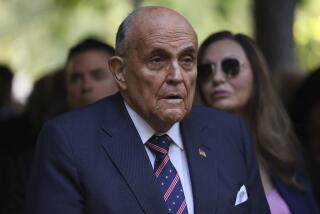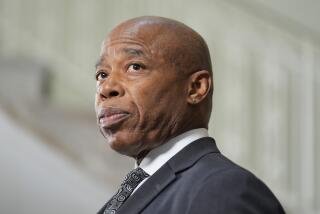Giuliani Drops Bid to Run Again
NEW YORK — After weeks of behind-the-scenes maneuvering, New York Mayor Rudolph W. Giuliani on Wednesday gave up a campaign to run for a third term and help the city cope with the World Trade Center disaster.
The mayor, who had publicly risen above politics in the days after the attacks and won international praise for his leadership, conceded that his efforts to suspend the city’s term limit law and seek another four years in office would be “divisive.” He feared it would spur litigation at a time when New York needs to heal.
Giuliani also backed away from a bid to extend his second term by 90 days, saying that while it would help the next mayor adjust to the gargantuan task of recovery, he would not actively pursue the idea.
“Maybe I was in a different world” in hoping that the bid to stay on could have steered clear of politics, Giuliani said Wednesday. But critics say the mayor’s setback was yet another example of how his ambitions and abrasive style marred what should have been a moment of great personal triumph.
“There are two sides to this guy and they always seem to be battling each other, very publicly,” said biographer Wayne Barrett, who has studied the Republican mayor. “In many ways, he just can’t help it. For every good thing that he does, he always finds a way to provoke criticism.”
Simply put, there’s Giuliani the leader and Giuliani the divider.
The leader rose to the occasion Sept. 11, comforting grief-stricken New Yorkers and rallying emergency forces to a scene of horror. Even Giuliani’s worst enemies praised him effusively, and many said the combative and caustic mayor had finally won the citywide adulation that had eluded him during eight years in office.
But Giuliani the divider squandered much of that goodwill, especially among political insiders, when word leaked out last week that he was asking mayoral candidates to make a tough decision: either extend his term by 90 days, or he would try to run for a third term.
“This is about the city; it’s not ideological, it’s not personal and it’s not political,” said the 57-year-old mayor, refusing to concede that his proposals might trigger a political firestorm among his enemies. “If they [state and city legislators] can work it out, God bless ‘em.”
Two mayoral candidates--Democrat Mark Green, the public advocate, and Republican media mogul Michael Bloomberg--agreed to the 90-day extension. But Bronx Borough President Fernando Ferrer, a Democrat seeking to become the city’s first Latino mayor, refused. He said Giuliani’s request was undemocratic.
Green and Ferrer will meet in a runoff Oct. 11, and the vote may well turn into a referendum on how New Yorkers feel about giving Giuliani more time in office. While many voters give the mayor high marks, harsh critics are surfacing.
Last week, on a day when 16 New York City firefighters were buried, the grief and solemnity were shattered by rancor over the mayor’s fight to stay on at City Hall. The mayor’s demand for more time “is an insult to the compassion and integrity of New Yorkers who worked so hard,” said the Rev. Al Sharpton. “We would have come together if Bozo was the mayor.”
Even some of the mayor’s closest allies, such as state Senate Majority Leader Joseph Bruno, had refused to aggressively back his request to suspend term limits. One observer, a Giuliani confidant, said that “he’s made a horrible mistake by coming on so strong. He could have left office like a genuine hero, he could have written his own ticket. But now he’s been sullied with politics.”
This week, the mayor’s personal approval ratings soared to 91%, according to the Quinnipiac poll, and when he spoke before the United Nations General Assembly, Secretary-General Kofi Annan dubbed him “Mayor of the World.”
But in the same poll, New Yorkers opposed the idea of giving Giuliani a third term by a 55% to 39% margin. “They clearly don’t want the rules of an election changed at the last minute,” said pollster Lee Miringoff.
So how could a man riding so high--a public official with such overwhelming support--make such a big political miscalculation?
“Giuliani is a person who not only likes to think of himself in control, he has to be totally in control,” said John Mollenkopf, professor of political science at the City University of New York Graduate School. “He has a primal need to be running things, to stay in the driver’s seat, and it has become obvious that he really didn’t want to give up the stage.”
Some observers say Giuliani’s bid to stay on and help the city through a difficult mayoral transition was scuttled by old enemies. He needed support from the City Council and the state Legislature to suspend the city’s term limit law, yet black and Latino leaders vowed that would never happen, citing years of friction and bitter clashes with him.
“Politics is a two-way process,” said Roger Green, chairman of the state Legislature’s black, Hispanic and Puerto Rican caucus. “This man hasn’t returned our phone calls for eight years. Why do him a favor?”
Others insist Giuliani was his own worst enemy, wrecking a moment of victory just as he has so many times before. In a city where shellshocked people are being urged to resume their daily lives, they say, the sight of Giuliani wrestling with his demons may be the most normal sign of all.
“I blame him directly for this” political impasse, Richard Goldstein, a Village Voice columnist, said on a local television news show. “He personally created a situation where blacks and Latinos in New York dislike him so much, they wouldn’t let him stay in office an extra day.”
Still others blame Giuliani’s setback on zealous staff members, who follow his wishes absolutely.
“You can sympathize with their [aides’] concerns, because they didn’t want to wake up on Jan. 1 and find they are no longer the center of the universe,” said a veteran New York political consultant who asked not to be identified. “They tried to win approval behind the scenes and people at City Hall were offended. These aides clearly were doing Rudy’s bidding.”
On the day before the World Trade Center attacks, Giuliani was a lame-duck mayor searching in vain for a legacy. He was the butt of jokes, forced out of Gracie Mansion--the mayor’s official residence--and living in a bachelor pad with two gay men as he fought a nasty divorce battle with his wife. He seemed marginalized and unfocused, a man used to being the center of attention who was slowly losing his audience.
Giuliani had hoped his legacy would be crowned with new baseball and football stadiums. They are not likely to be built now, given the city’s grave financial condition. Yet veteran observers say his true legacy will be forever rooted in the rubble of the World Trade Center, and in the hearts of New Yorkers who finally saw him display genuine compassion for others.
“It was an amazing epiphany for him, that disaster,” said former Mayor Edward I. Koch, a harsh Giuliani critic. “We saw a side of him that was extraordinary. And then boom! He reverts to type, like he always does.”
During eight years in office, Giuliani won kudos for presiding over New York City’s stunning drop in crime. Yet he was vilified for seeming to dismiss minority complaints about police brutality. Critics said he showed great insensitivity toward innocent black victims killed by police.
The mayor made headlines around the world in his efforts to make New York a more civil place; he cracked down on squeegee men, porn shop owners, street vendors, rude taxi drivers, litterers and even jaywalkers. But he embarrassed many by leaking unsavory details of his divorce. The story played out in court and on the front pages, repelling many.
Giuliani won great sympathy last year when he revealed that he had prostate cancer, a setback that caused him to abandon a projected U.S. Senate race against Hillary Rodham Clinton. But even that moment was marred by subsequent disclosures that he had a girlfriend, Judith Nathan. New Yorkers might not have begrudged him his private life, but he flaunted the relationship, taking public nighttime strolls with Nathan while his wife, Donna Hanover, was home with their two children.
Giuliani has made no apologies for his rough, take-no-prisoners style; he’s often joked that his personality was molded by the experience of growing up as a Yankee fan in Brooklyn, where the rival Dodgers used to play. Bright and ambitious, he was drawn to the law and eventually became the U.S. attorney for the Southern District of New York. He gained a national reputation as a crime-busting crusader against Mafia chieftains, crooked Wall Street traders and corrupt cops.
Giuliani ran for mayor in 1989, narrowly losing to David Dinkins, the city’s first African American mayor. He won a hard-fought rematch four years later, and was easily reelected in 1997.
In the coming weeks, Giuliani will have an opportunity to repair any public relations damage by focusing on the recovery and forgoing any further thoughts of staying in office, said Mollenkopf.
“People will thank him,” Mollenkopf said. “But they’re also saying, ‘We’re choosing a new leader, Rudy. And it’s time for you to move on.’ ”
More to Read
Get the L.A. Times Politics newsletter
Deeply reported insights into legislation, politics and policy from Sacramento, Washington and beyond. In your inbox three times per week.
You may occasionally receive promotional content from the Los Angeles Times.










